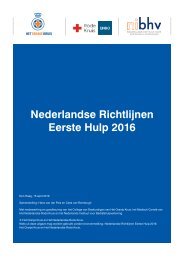Thesis-Anne-Vos-Masters-SBR-and-EU-Law-3
Thesis-Anne-Vos-Masters-SBR-and-EU-Law-3
Thesis-Anne-Vos-Masters-SBR-and-EU-Law-3
Create successful ePaper yourself
Turn your PDF publications into a flip-book with our unique Google optimized e-Paper software.
scale or effects of the proposed action, should better be achieved at Union level. 222 The Union may<br />
only act if these three criteria are fulfilled. As such, "[i]t is not a rule of competence but a principle<br />
which concerns the exercise of that competence, <strong>and</strong> predetermines the activity of the European<br />
Union". 223<br />
Protocol (No 2) on the application of the principles of subsidiarity <strong>and</strong> proportionality strives to<br />
establish the conditions for the application of the principles <strong>and</strong> to establish a system for monitoring<br />
the application of those principles. The aim is the protection of the sovereignty of MS <strong>and</strong> their<br />
ability to take their own decisions but also to provide for intervention by the Union if the unilateral<br />
actions are not sufficient. Another objective is the security that decisions are taken as closely as<br />
possible to the citizens of the Union. 224 This is confirmed by Article 1 T<strong>EU</strong>. The conditions deriving<br />
from the Protocol are as follows. The Commission shall, before proposing legislative acts, 225<br />
prepare a Green Paper which consists of wide-ranging consultations, in which it takes into account<br />
the regional <strong>and</strong> local dimension of the action envisaged. The drafter of the legislative acts<br />
(Commission, EP, Council) shall forward its draft to the national parliaments. According to Article 5<br />
of the Protocol, the draft legislative acts should be justified with regard to the principles. Any draft<br />
legislative act should contain a detailed statement making it possible to appraise compliance with<br />
the principles. The reasons for concluding that a Union objective can be better achieved at Union<br />
level shall be substantiated by qualitative <strong>and</strong>, wherever possible, quantitative indicators. Here, the<br />
second criteria of Article 5(3) T<strong>EU</strong> can be recognised. In the preamble of all legislation (to date),<br />
this 'detailed statement' is always set out in order to show that the legislation is in compliance.<br />
Here, <strong>EU</strong> institutions have broad discretionary space. 226 It should be pointed out that this detailed<br />
statement often has a somewhat st<strong>and</strong>ardised character. 227<br />
After the drafter has concluded its consultation <strong>and</strong> made a detailed statement, he finishes the<br />
draft legislative act. Within eight weeks from the date of transmission of a draft legislative act, any<br />
national Parliament or any chamber of a national Parliament may, according to Article 6, send to<br />
the Presidents of the European Parliament, the Council <strong>and</strong> the Commission a reasoned opinion<br />
stating why it considers that the draft in question does not comply with the principle of subsidiarity.<br />
The drafter of the legislative act (may it be the EP, the Council, the Commission, the group of<br />
Member States, the Court of Justice, the European Central Bank or the European Investment Bank)<br />
shall take account of these reasoned opinions. Each national Parliament shall have two votes,<br />
shared out on the basis of the national parliamentary system. Where reasoned opinions on a draft<br />
legislative act’s non-compliance with the principle of subsidiarity represent at least one third of all<br />
the votes allocated to the national parliaments in accordance with the second subparagraph of<br />
paragraph 1, the draft must be reviewed (the 'yellow card' procedure). 228 After such review, the<br />
drafter may decide to maintain, amend or withdraw the draft. Reasons must be given for this<br />
decision. Under the ordinary legislative procedure, where reasoned opinions represent at least a<br />
simple majority of the votes allocated to the national parliaments, the proposal must also be<br />
reviewed. If it chooses to maintain the proposal, the Commission will have to, in a reasoned<br />
opinion, justify why it considers that the proposal complies with the principle of subsidiarity. This<br />
reasoned opinion, as well as the reasoned opinions of the national parliaments, will have to be<br />
submitted to the Union legislator, for consideration in the procedure. If, by a majority of 55 % of the<br />
members of the Council or a majority of the votes cast in the EP, the legislator (the EP <strong>and</strong> the<br />
Council) is of the opinion that the proposal is not compatible with the principle of subsidiarity, the<br />
222<br />
Fact Sheets on the European Union 2014, source: http://www.europarl.europa.eu/ftu/pdf/en/FTU_1.2.2.pdf<br />
223<br />
Krämer (2011), p. 16.<br />
224<br />
Fact Sheets on the European Union 2014, source: http://www.europarl.europa.eu/ftu/pdf/en/FTU_1.2.2.pdf<br />
225<br />
According to Article 3 of Protocol No 2, 'draft legislative acts' shall mean proposals from the Commission, initiatives from<br />
a group of Member States, initiatives from the European Parliament, requests from the Court of Justice, recommendations<br />
from the European Central Bank <strong>and</strong> requests from the European Investment Bank, for the adoption of a legislative act.<br />
226<br />
Krämer (2011), p. 17.<br />
227<br />
Jans & Vedder (2012), p. 14.<br />
228<br />
The first 'yellow card' procedure concerned the Monti II regulation, May 2012.<br />
54



